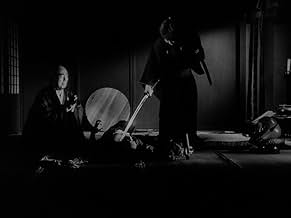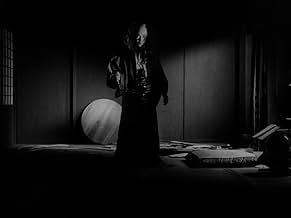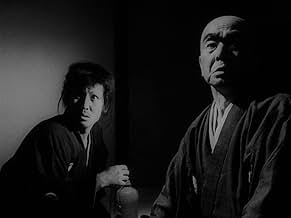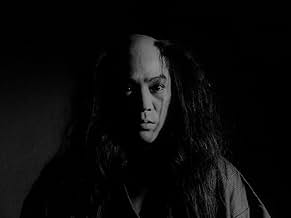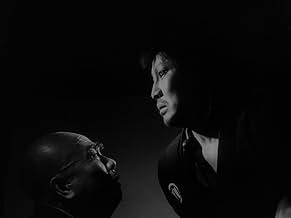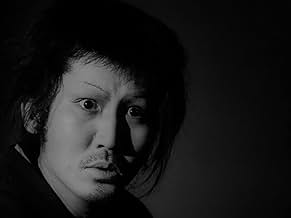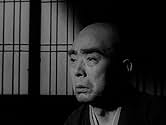IMDb RATING
7.9/10
3.3K
YOUR RATING
After being robbed by a geisha, a ronin warrior carves a bloody path to seek revenge.After being robbed by a geisha, a ronin warrior carves a bloody path to seek revenge.After being robbed by a geisha, a ronin warrior carves a bloody path to seek revenge.
- Director
- Writers
- Stars
- Director
- Writers
- All cast & crew
- Production, box office & more at IMDbPro
Featured reviews
A very slow burn of a horror movie. I had no idea what to expect from a Japanese movie from the 1970s. I've seen very few Japanese films overall, and definitely no horror ones.
I honestly have no idea how to contextualize this one. I have absolutely no frame of reference for what I just watched. Certainly unlike any film (that I know of) that was released before this. This makes me want to watch more Japanese films, and definitely more Japanese horror. That is the mark of a great film.
I wasn't sure whether I read the genre properly for this film because the build up is not typical of the genre.
Once it gets going it does not stop. And the circular storytelling is so satisfying. I wasn't feeling this one until it gets to around the halfway point and I realized this wasn't just horror for horror's sake. Really interesting film that I want to revisit someday, probably next October.
Hopefully I'll have a more nuanced understanding of the Japanese film scene by then.
I honestly have no idea how to contextualize this one. I have absolutely no frame of reference for what I just watched. Certainly unlike any film (that I know of) that was released before this. This makes me want to watch more Japanese films, and definitely more Japanese horror. That is the mark of a great film.
I wasn't sure whether I read the genre properly for this film because the build up is not typical of the genre.
Once it gets going it does not stop. And the circular storytelling is so satisfying. I wasn't feeling this one until it gets to around the halfway point and I realized this wasn't just horror for horror's sake. Really interesting film that I want to revisit someday, probably next October.
Hopefully I'll have a more nuanced understanding of the Japanese film scene by then.
If anyone imagined how a Greek tragedy would look if it was set in feudal Japan, look no further. It is a harrowing, exhausting, depressive experience, but it's worth it. The film follows a once great warrior, now a Ronin (for those unfamiliar, Ronin is a samurai without a master), named Gengobe, who has sold all of his property to repay his debts. He is in love with a geisha who is to be married to a rich lord, unless someone pays 100 Ryō for her liberty. Once he realizes that he was being played by this geisha and her husband, of whose existence he was unaware of, he becomes hell bent on revenge.
The film emits a strange sense of reality distortion. The film begins with a dream sequence, that is somewhat foreshadowing of things to happen. This theme is prevalent throughout the film. We can see things unfolding, only to realize that it was just a thought, or a fantasy of a certain characters. Reality tends to be different, albeit sometimes it can lead to the same conclusion. What was particularly striking was the way the graphic scenes of violence were portrayed. They were slowed down, they almost feel other-wordly, yet these graphic scenes are strangely beautiful. Highly contrasted Black and white cinematography helps this, we see characters illuminated against dark background like phantoms and the black blood coming out of the wounds becomes even more noticeable.
Shura is a tale of vengeance than leads all the parties involved into an abyss of some sort. There is no bright light at the end of the tunnel. Because of mere 100 Ryō, these people have turned into "Demons" and they're lives became "Hell". This film isn't disturbing because of its visual content, but because of its emotional impact. Gengobe isn't a typical hero, the reason why one would want to root for him is because he is an agent of justice (like Monte Cristo), but not because he himself is a virtuous hero worth rooting for. It's easy to hate most, if not all of the characters, but at the same time, it's difficult not to feet pity for them. Seldom comes a film that makes one feel this way.
This film is not for everyone, it's extremely pessimistic, it doesn't offer glimmers of hope. It's not an easy watch, but it's worth it. I highly recommend it to anyone who is interested in film as an art form.
The film emits a strange sense of reality distortion. The film begins with a dream sequence, that is somewhat foreshadowing of things to happen. This theme is prevalent throughout the film. We can see things unfolding, only to realize that it was just a thought, or a fantasy of a certain characters. Reality tends to be different, albeit sometimes it can lead to the same conclusion. What was particularly striking was the way the graphic scenes of violence were portrayed. They were slowed down, they almost feel other-wordly, yet these graphic scenes are strangely beautiful. Highly contrasted Black and white cinematography helps this, we see characters illuminated against dark background like phantoms and the black blood coming out of the wounds becomes even more noticeable.
Shura is a tale of vengeance than leads all the parties involved into an abyss of some sort. There is no bright light at the end of the tunnel. Because of mere 100 Ryō, these people have turned into "Demons" and they're lives became "Hell". This film isn't disturbing because of its visual content, but because of its emotional impact. Gengobe isn't a typical hero, the reason why one would want to root for him is because he is an agent of justice (like Monte Cristo), but not because he himself is a virtuous hero worth rooting for. It's easy to hate most, if not all of the characters, but at the same time, it's difficult not to feet pity for them. Seldom comes a film that makes one feel this way.
This film is not for everyone, it's extremely pessimistic, it doesn't offer glimmers of hope. It's not an easy watch, but it's worth it. I highly recommend it to anyone who is interested in film as an art form.
I don't know that there's anything in this movie which blew me away, but there was also nothing which bothered me either. I suppose the plot is a fairly straightforward revenge story, but the stylistic elements of the film were more than enough to save the film. For instance, I liked the usage of darkness and shadows in several scenes. I don't know if I can quite put my finger on why those elements work, but something about seeing various characters appear/disappear from the shadows gives the film a dreamy aesthetic. I also liked how certain scenes were repeated. Through these scenes, you get a sense of Gengobei imagining how he wants to behave in certain situations or how some of the violence he commits or witnesses it etched into his head. These scenes also cause the film to become a subjective experience which puts you in Gengobei's headspace really well. Finally, the high level of violence also surprised me. While certain elements like the slow motion and the (relatively) high levels of blood help in this regard, that most of the deaths are prolonged gives them even more staying power. All things considered, this is definitely the most violent classic samurai film I've seen. As I said at the start of this review, I wouldn't say this film blew me away, but I do have a lot of respect for the film's technical qualities. It's a stylistically impressive take on the revenge film which is so unique with its craft that you eventually stop caring about its somewhat barebones plot.
It is sometime during the Edo period, and Soemon is a Ronin living under the assumed name of Gengobe in Fukugawa, Tokyo. Indebted and unable to acquire the necessary funds to join the 47 Ronin in their quest of vengeance, he spends his days drinking sake and his nights with geishas. One geisha in particular: Koman, who pledges her eternal love for him. This love proves to be fickle, for Koman is a married woman. After his servant Hachiemon acquires 100 Ryo for Soemon to join the Ronin, he is quickly swindled by Koman and her husband Sangorô. Left penniless once more, Soemon descends into a bloody spiral of insanity and violence from which he may never return.
Written and directed by Toshio Matsumoto- and based on the Kabuki play 'Kamikakete Sango Taisetsu' by Nanboku Tsuruya and Shûji Ishizawa- 'Shura' is a strikingly photographed tale of revenge and madness that plays like a samurai film noir. Containing hard-hitting violence, a cynical anti-hero and a duplicitous femme fatale, the film bears many of the hallmarks that informed the noir movement of the 40's and 50's. Told in a non-linear fashion, the narrative incorporates flashbacks, alternative scenarios and repetition, challenging and confusing the viewer. The story is a gritty, dark one, maintaining a bleak and fatalistic tone, which is only heightened by the striking cinematography from Tatsuo Suzuki.
Shot in black and white, Suzuki makes excellent, evocative use of light and shadows, creating a startling contrast that adds a sinister sense of despair and claustrophobia to proceedings. His usage of dissolves, super-impositions, angled shots and zooms heightens the narrative tension, whilst also lending the film a surreal, eerie quality that strengthens the narrative impact. Suzuki also utilises the minimalist sets- a nod to the film's origins in Kabuki theatre- masterfully, making the most of the limited spaces in an artful and imaginative way.
A frequent collaborator of Matsumoto's- working on at least three of his films, including the acclaimed 'Funeral Parade of Roses'- Suzuki was at the forefront of Japanese experimental cinema. Working alongside a variety of independent directors, Suzuki made a name for himself as an innovator in terms of cinematography and its capabilities. His avant-garde work could very well be seen as influential on, or as a forerunner to, the work of Shinya Tsukamoto, or even David Lynch. Here, he leaves the audience wide-eyed in wonder at the eerie, noiresque imagery- be it of apparent floating lamps chasing our central character or the beautiful visage of a geisha, highlighting the torment in her eyes. Throughout 'Shura,' Suzuki's efforts don't just bolster the narrative and its tone- they leave you spellbound.
As do the intense performances from the cast, most notably Katsuo Nakamura as Soemon. A former Kabuki actor, Nakamura displays his character's complex emotions and inner turmoil fantastically, utilizing expressive gestures, movements and facial expressions. He interacts with the rest of the cast convincingly, painting a compelling portrait of a man driven to madness and violence by the actions of others. Alongside him, Yasuko Sanjo delivers a masterclass in understatement as the geisha Koman. She brings much grace and elegance to the role, perhaps accrued from her years as a dancer, leaving an indelible impression on the viewer. Masao Imafuku also does fine work as the servant Hachiemon, the only real honorable one in the film; stealing every scene he's in.
Although those who shy away from violent films might not appreciate the amount of gore in 'Shura', anyone who enjoys Samurai movies, or a good revenge story, will likely be most pleased by the film. Beautifully shot by Tatsuo Suzuki and featuring commendable performances from all in the cast, there's a lot going for it. A strong narrative, deft direction- 'Shura' may be one of the best Samurai film noirs you'll ever see.
Written and directed by Toshio Matsumoto- and based on the Kabuki play 'Kamikakete Sango Taisetsu' by Nanboku Tsuruya and Shûji Ishizawa- 'Shura' is a strikingly photographed tale of revenge and madness that plays like a samurai film noir. Containing hard-hitting violence, a cynical anti-hero and a duplicitous femme fatale, the film bears many of the hallmarks that informed the noir movement of the 40's and 50's. Told in a non-linear fashion, the narrative incorporates flashbacks, alternative scenarios and repetition, challenging and confusing the viewer. The story is a gritty, dark one, maintaining a bleak and fatalistic tone, which is only heightened by the striking cinematography from Tatsuo Suzuki.
Shot in black and white, Suzuki makes excellent, evocative use of light and shadows, creating a startling contrast that adds a sinister sense of despair and claustrophobia to proceedings. His usage of dissolves, super-impositions, angled shots and zooms heightens the narrative tension, whilst also lending the film a surreal, eerie quality that strengthens the narrative impact. Suzuki also utilises the minimalist sets- a nod to the film's origins in Kabuki theatre- masterfully, making the most of the limited spaces in an artful and imaginative way.
A frequent collaborator of Matsumoto's- working on at least three of his films, including the acclaimed 'Funeral Parade of Roses'- Suzuki was at the forefront of Japanese experimental cinema. Working alongside a variety of independent directors, Suzuki made a name for himself as an innovator in terms of cinematography and its capabilities. His avant-garde work could very well be seen as influential on, or as a forerunner to, the work of Shinya Tsukamoto, or even David Lynch. Here, he leaves the audience wide-eyed in wonder at the eerie, noiresque imagery- be it of apparent floating lamps chasing our central character or the beautiful visage of a geisha, highlighting the torment in her eyes. Throughout 'Shura,' Suzuki's efforts don't just bolster the narrative and its tone- they leave you spellbound.
As do the intense performances from the cast, most notably Katsuo Nakamura as Soemon. A former Kabuki actor, Nakamura displays his character's complex emotions and inner turmoil fantastically, utilizing expressive gestures, movements and facial expressions. He interacts with the rest of the cast convincingly, painting a compelling portrait of a man driven to madness and violence by the actions of others. Alongside him, Yasuko Sanjo delivers a masterclass in understatement as the geisha Koman. She brings much grace and elegance to the role, perhaps accrued from her years as a dancer, leaving an indelible impression on the viewer. Masao Imafuku also does fine work as the servant Hachiemon, the only real honorable one in the film; stealing every scene he's in.
Although those who shy away from violent films might not appreciate the amount of gore in 'Shura', anyone who enjoys Samurai movies, or a good revenge story, will likely be most pleased by the film. Beautifully shot by Tatsuo Suzuki and featuring commendable performances from all in the cast, there's a lot going for it. A strong narrative, deft direction- 'Shura' may be one of the best Samurai film noirs you'll ever see.
A heartbroken samurai in deep need of money is pushed to the edge and seeks revenge for his poor soul. But as he goes deeper with his revenge, discovers the people who stifled him may not be as different of people after all.
Pretty much a stylistic film akin to other famous Film Noir of the 40s and 50s. I would even categorize it as 'Gothic' and verging towards Expressionism with its deep saturated shadows and lighting that shadows the mental state of the film's characters. Its such a vision to be honest.
The story is what I believe is the weakest of the story. Its somewhat standard in a sense AND if you know his other film, you kinda knew what will happens. Its not as left field AND thematically rich compared to Funeral Parade of Roses. It's a story that had been told a hundred times AND while unique in its infusion of his dreamy stylings - it does not really feel like it adds much to the film. It works but not in a magical way that his early works shine through. It's more or less a preference thing on my side.
Acting wise, this is such a masterful direction. It is also Gothic by nature AND there is a sense of surrealism in how elevated their performances are. It perfectly matches the highly stylistic nature of the film, which I love. Katsuo Nakamura is amazing in his performance as a crazed samurai who just wants some money to escape his position. He really captures what this films what to evoke. Its kinda sad looking into his filmography that he seems to have gotten the prestige I think he could have.
Overall, a very worthy film to watch. It holds well against Funeral Parade AND shows a master stylist who knows how to modulate performers to boot.
Pretty much a stylistic film akin to other famous Film Noir of the 40s and 50s. I would even categorize it as 'Gothic' and verging towards Expressionism with its deep saturated shadows and lighting that shadows the mental state of the film's characters. Its such a vision to be honest.
The story is what I believe is the weakest of the story. Its somewhat standard in a sense AND if you know his other film, you kinda knew what will happens. Its not as left field AND thematically rich compared to Funeral Parade of Roses. It's a story that had been told a hundred times AND while unique in its infusion of his dreamy stylings - it does not really feel like it adds much to the film. It works but not in a magical way that his early works shine through. It's more or less a preference thing on my side.
Acting wise, this is such a masterful direction. It is also Gothic by nature AND there is a sense of surrealism in how elevated their performances are. It perfectly matches the highly stylistic nature of the film, which I love. Katsuo Nakamura is amazing in his performance as a crazed samurai who just wants some money to escape his position. He really captures what this films what to evoke. Its kinda sad looking into his filmography that he seems to have gotten the prestige I think he could have.
Overall, a very worthy film to watch. It holds well against Funeral Parade AND shows a master stylist who knows how to modulate performers to boot.
Did you know
- TriviaIncluded among Letterboxd's Top 250 Horror Films.
- How long is Demons?Powered by Alexa
Details
- Runtime
- 2h 14m(134 min)
- Color
- Sound mix
- Aspect ratio
- 1.37 : 1
Contribute to this page
Suggest an edit or add missing content

